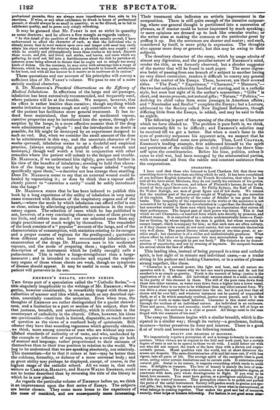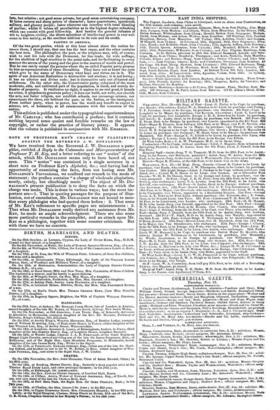EMERSON'S ESSAYS, SECOND SERIES.
Tess forms part of a speculation called the "Catholic Series,"—a title singularly inapplicable to the writings of Mr. EMERSON; whose genius, however considerable, is remarkably tinged with those pe- culiarities of manner and idea which, as much as any doctrinal opi- nion, essentially constitute the sectarian. Even when true, the thoughts of EMERSON are rather distinguished for a quaint shrewd- ness, and a limitation to a part or section of his subject, than for that justness, breadth, and universality, which in criticism is the counterpart of catholicity in the church. Often, however, his ideas are questionable—their truth is limited, disputable, as much matter of question as the views of a confined body of opinionists. Still oftener they have that sounding vagueness which generally obtains, , we think, more among coteries of men who are without any este- b/lehed standards of authority or of taste, and who, unchecked by the example or influence of superiors, acquire a swelling air both of manner and language, rather proportioned to their estimate of themselves than to their true position in relation to the world. We beg to be understood that we are speaking absolutely, not relatively. This mannerism—for to that it comes at last—may be better than the coldness, formality, or dulness of a more universal body ; and as great ability may perhaps be displayed, except, of course, in the highest range of the catholic school. All we mean is, that such writers as CsaLrLE, Haararr, and RALPH WALDO EMERSON, could not be better described than by reversing the title of the library in which he is now placed. As regards the particular volume of EMERSON before us, we think it an improvement upon the first series of Essays. The subjects are better chosen. They come more home to the experience of the mass of mankind, and are consequently more interesting. Their treatment also indicates an artistic improvement in the composition. There is still quite enough of the iterative outpour- ing, where one general thought is partitioned into a succession of phrases, as if matter could be better impressed by much speaking; or mere opinions are dressed up to look like oracular truths; or the writer aims at making the common or the particular great by puffing it up. But the sentences are shorter and neater ; and each, considered by itself, is more pithy in expression. The thoughts also appear more deep or general; but this may be owing to their subjects.
The desultory character of the essay, which by usage admits of almost any digression, and the peculiar nature of EMERSON'S mind, render the title, as we formerly observed, but a slender suggester of the matter that will be found in each paper. The same digres- sive habit of passing from one branch of a subject to another having no very direct connexion, renders it difficult to convey any general idea of the matter of his Essays. These, however, are their avowed titles. "The Poet," " Experience," "Character," " Manners,"— the two last subjects admirably handled at starting, and in a catholic style, but soon lost sight of in the author's mannerism ; "Gifts " is short, and means presents, not natural gifts ; "Nature," "Politics,"— deriving its chief value from some passages. in American affairs; and "Nominalist and Realist" complete the Essays ; but a Lecture, addressed to the Society called New England Reformers, though differing little from the Essays, is added, and may be said to form an eighth.
The following is part of the opening of the chapter on Character which we have alluded to. The problem it puts forth is, we think, one universally felt to be difficult ; and EMERSON'S solution may be received till we get a better. But when a man's fame in the eyes of posterity surpasses his apparent acts, we suspect that he must have embodied some new principle. Thus, Lord Cniersrass, EMERSON'S leading example, first addressed himself to the spirit and patriotism of the middle class in civil politics—he threw him- self upon the constituencies. Before his time, politics, unless it came to civil war, had been managed by the aristocratical parties, with occasional aid front the rabble and constant assistance from the corporations.
CHARACTER.
I have read that those who listened to Lord Chatham felt that there was something doer in the man than anything which be said. It has been complained
of our brilliant English historian of the French Revolution, that when he has
told all his facts about Mirabeau, they do not justify his estimate of his '°crams. The Gracchi, Agis, Cleomenes, and others of Plutarch's heroes, do not in the record of facts equal their own fame. Sir Philip Sydney, the Earl of Essex, Sir Walter Raleigh, are men of great figure and of few deeds. We cannot find the smallest part of the personal weight of Washington in the narrative
of his exploits. The authority of the name of Schiller is too great for his books. This inequality of the reputation to the works or the anecdotes is not accounted for by saying that the reverberation is 1..i.iger than the thunder-clap; but somewhat resided in these men which begot an expectation that outran all ' their performance. The largest part of their power was latent. This is that which we call Character,—a reserved force which acts directly by presence, and ' without means. It is conceived of as a certain undemonstrable force—a Fami- liar or Genius, by whose impulses the man is guided, but whose counsels he cannot impart, which is company for him; so that such men are often solitary, or if they chance to be social, do not need society, but can entertain themselves very well alone. The purest literary talent appears at one time great, at an- other small; but character is of a stellar and undiminishable greatness. What others effect by talent or by eloquence this man accomplishes by some mag- netism. " Half his strength be put not forth." His victories are by demon- stration of superiority, and not by crossing of bayonets. He conquers because his arrival alters the face of affairs.
This leading idea instead of being pursued in a trae and catholic spirit, is lost sight Of in minute and individual cases,—as a trader sitting in his parlour and looking Character, or in a series of phrases strung together, like these.
" Character is a natural power, like light and heat, and all nature co- operates with it. The reason why we feel one man's presence and do not feel another's is as simple as gravity. Truth is the summit of being: justice is the application of it to affairs. All individual natures stand in a scale according to the purity of this element in them. The will of the pure runs down from them into other natures, as water runs down from a higher into a lower vesseL This natural force is no more to be withstood than any other natural force. We can drive a stone upward for a moment into the air, but it is yet true that all stones will for ever fall; and whatever instances can be quoted of unpunished theft or of a lie which somebody credited, justice must prevail, and it is the privilege of truth to make itself believed. Character is this moral order seen through the medium of an individual nature. An individual is an enclosure. Time and space, liberty and necessity, truth and thought, are left at large no longer. Now, the universe is a close or pound. All things exist in the man tinged with the manners of his soul."
The essay on Manners begins with a similar breadth, which is dis- sipated in a similar way; though its variety—a gentleman, fashion, manners—better preserves its force and interest. There is a good thal of truth and keenness in the following remarks.
BEAUTY AND MEASURE IN MANNERS.
We imperatively requires perception of soda homage to beauty in our com- panions. Other virtues are in request in the field and work-yard, but a certain degree of taste is not to be spared in those we sit with. I could better eat with one who did not respect the truth or the laws than with a sloven and unpre- sentable person. Moral qualities rule the world, but at short distances the senses are despotic. The same discrimination of fit and fair runs out, if with less rigour, into all parts of life. The average spirit of the energetic class is good sense, acting under certain limitations and to certain ends. It entertains every natural gift. Social in its nature, it respects everything which tends to unite men. It delights in measure. The love of beauty is mainly the love of mea- sure or proportion. The person who screams, or uses the superlative degree, or converses with heat, puts whole drawingrooms to flight. If you wish to be loved, love measure. You must have genius, or a prodigious usefulness, if you will hide the want of measure. This perception comes in to polish and perfect the parts of the social instrument. Society will pardon much to genius and spe- cial gifts ; but, being in its nature a convention, it loves what is conventional, or what belongs to coming together. That makes the good and bad of manners, namely, what helps or hinders_ fellowship. For fashion is not good sense able- lute, but relative; not good sense private, but good sense entertaining company. It hates corners and sharp points of character; hates quarrelsome, egotistical, solitary. and gloomy people; hates whatever can interfere with total blending of parties; whilst it values all peculiarities as in the highest degree refreshing which can consist with good fellowship. And besides the general infusion of wit to heighten civility, the direct splendour of intellectual power is ever wel- come in See society, as the costliest addition to its rule and its credit.
PARTIES IN AMERICA.
Of the two great parties, which at this hour almost share the nation be- tween them, I should say, that one has the best cause, and the other contains the best men. The philosopher, the poet, or the religions man, will, of course, wish to cast his vote with the Democrat, for free trade, for wide suffrage, for the abolition of legal cruelties in the penal code, and for facilitating in every manner the access of the young and the poor to the sources of wealth and power. But he can rarely accept the persons whom the so-called Popular party propose to him as representatives of these liberalities. They have not at heart the ends which give to the name of Democracy what hope and virtue are in it. The spirit of our American Radicalism is destructive and aimless; it is not loving; it has no ulterior and divine ends ; but is destructive only out of hatred and selfishness. On the other side, the Conservative party, composed of the most moderate, able, and cultivated part of the population, is timid, and merely de- fensive of property. It vindicates no right, it aspires to no real good, it brands no crime, it proposes no generous policy; it does not build, nor write, nor cherish the arts, nor foster religion, nor establish schools, nor encourage science, nor emancipate the slave, nor befriend the poor, or the Indian, or the immigrant. From neither party, when in power, has the world any benefit to expect in science, art, or humanity, at all commensurate with the resources of the nation.
This edition is published under the typographical superintendence of Mr. CARLYLE ; who has contributed a preface; but it contains nothing beyond some quaint and forcible remarks on the law of copyright, or rather the practice of literary piracy. It appears that the volume is published in conjunction with Mr. EMERSON.



























 Previous page
Previous page